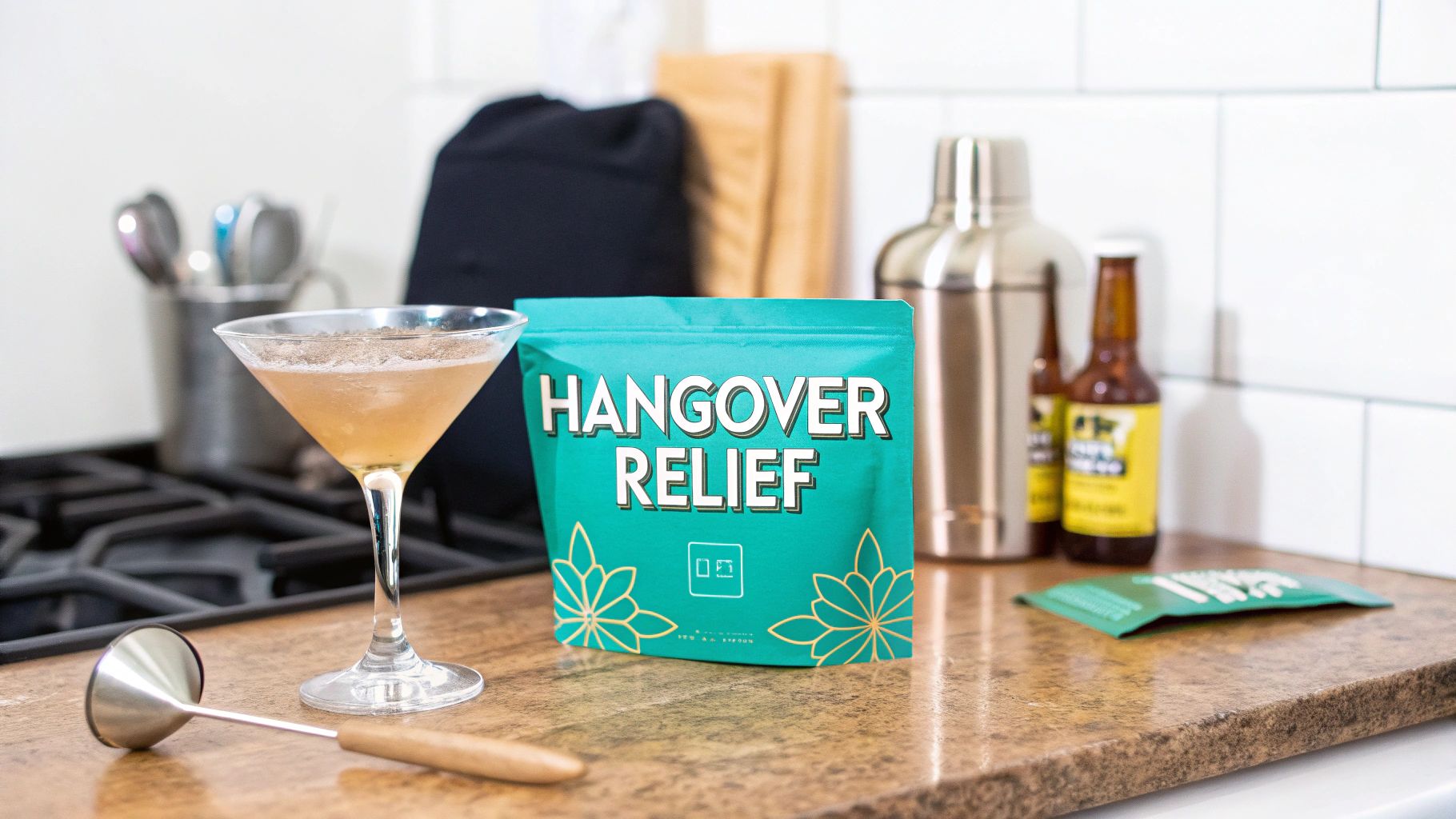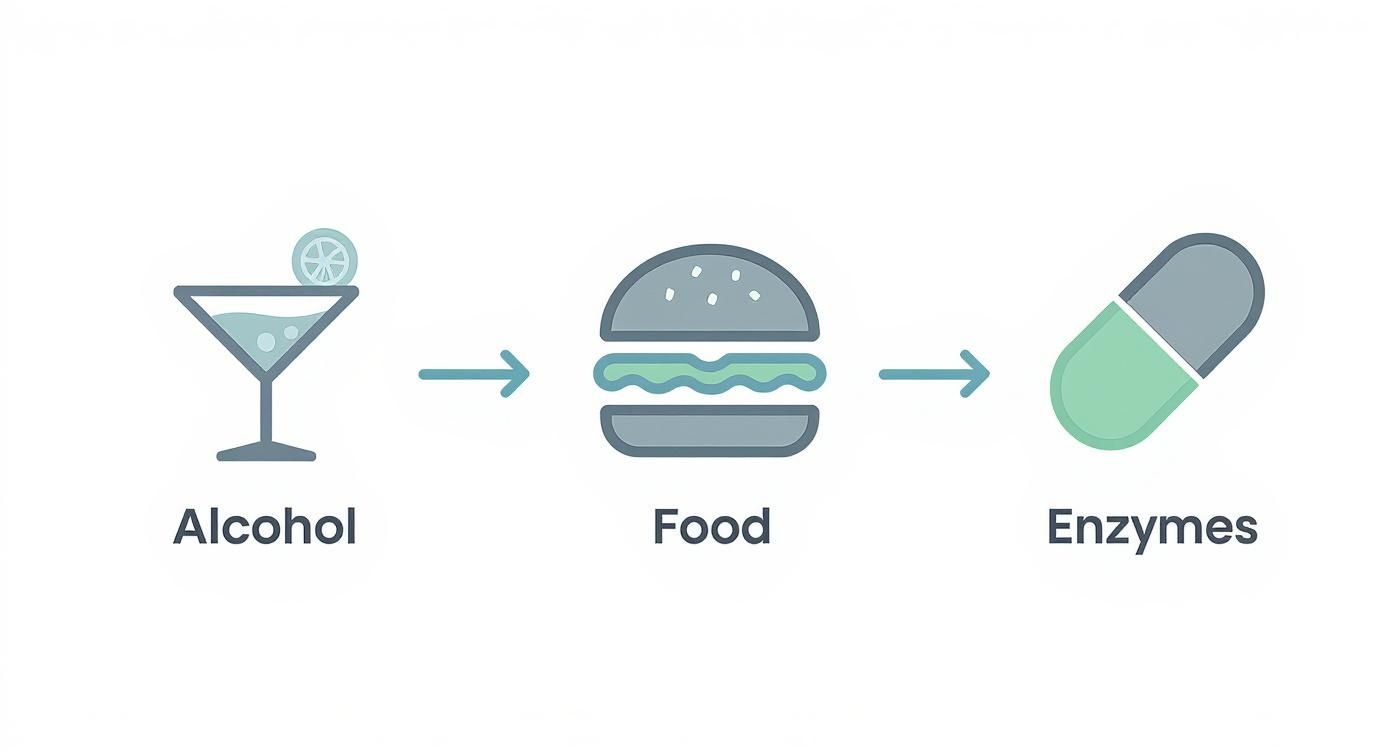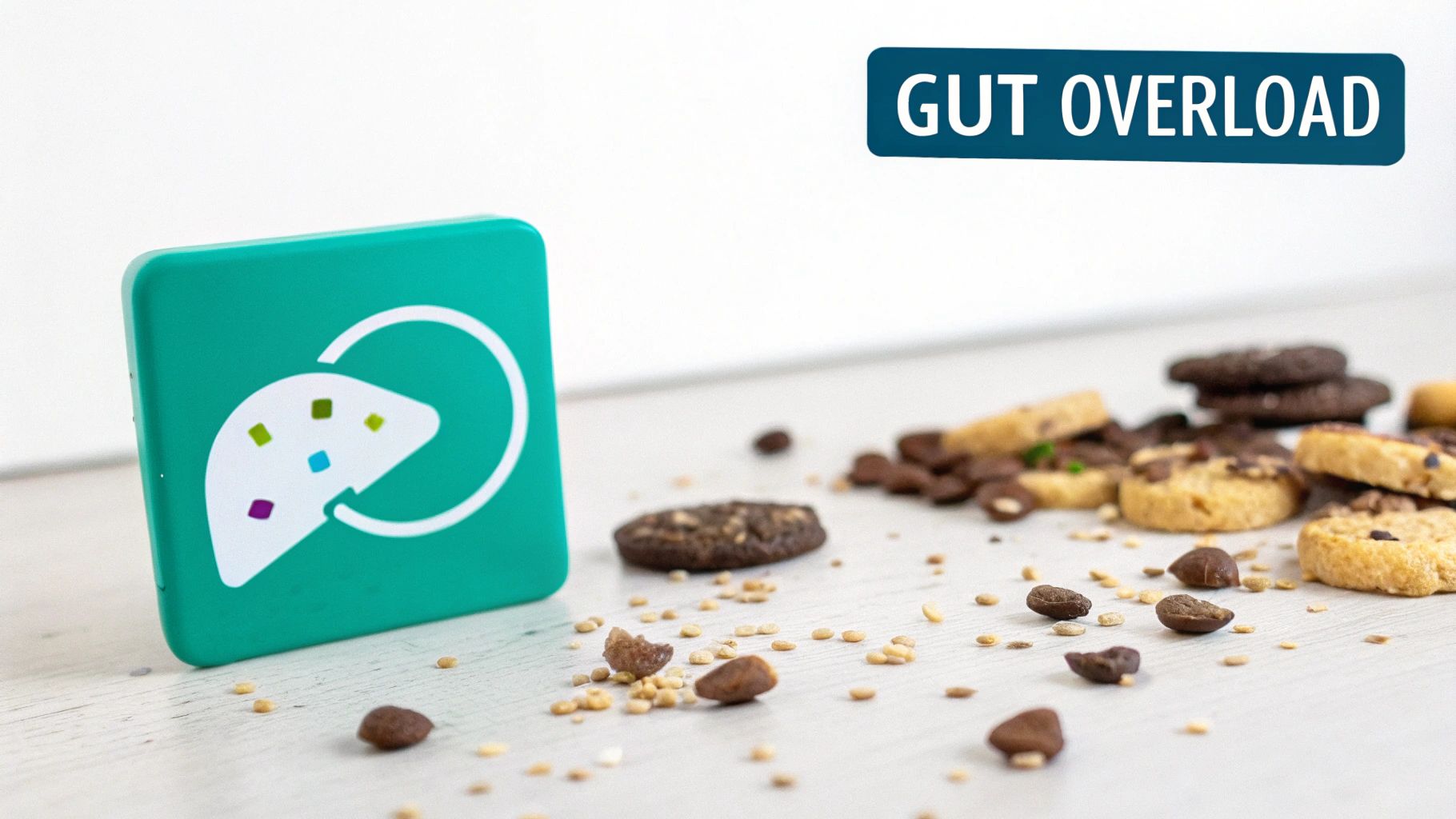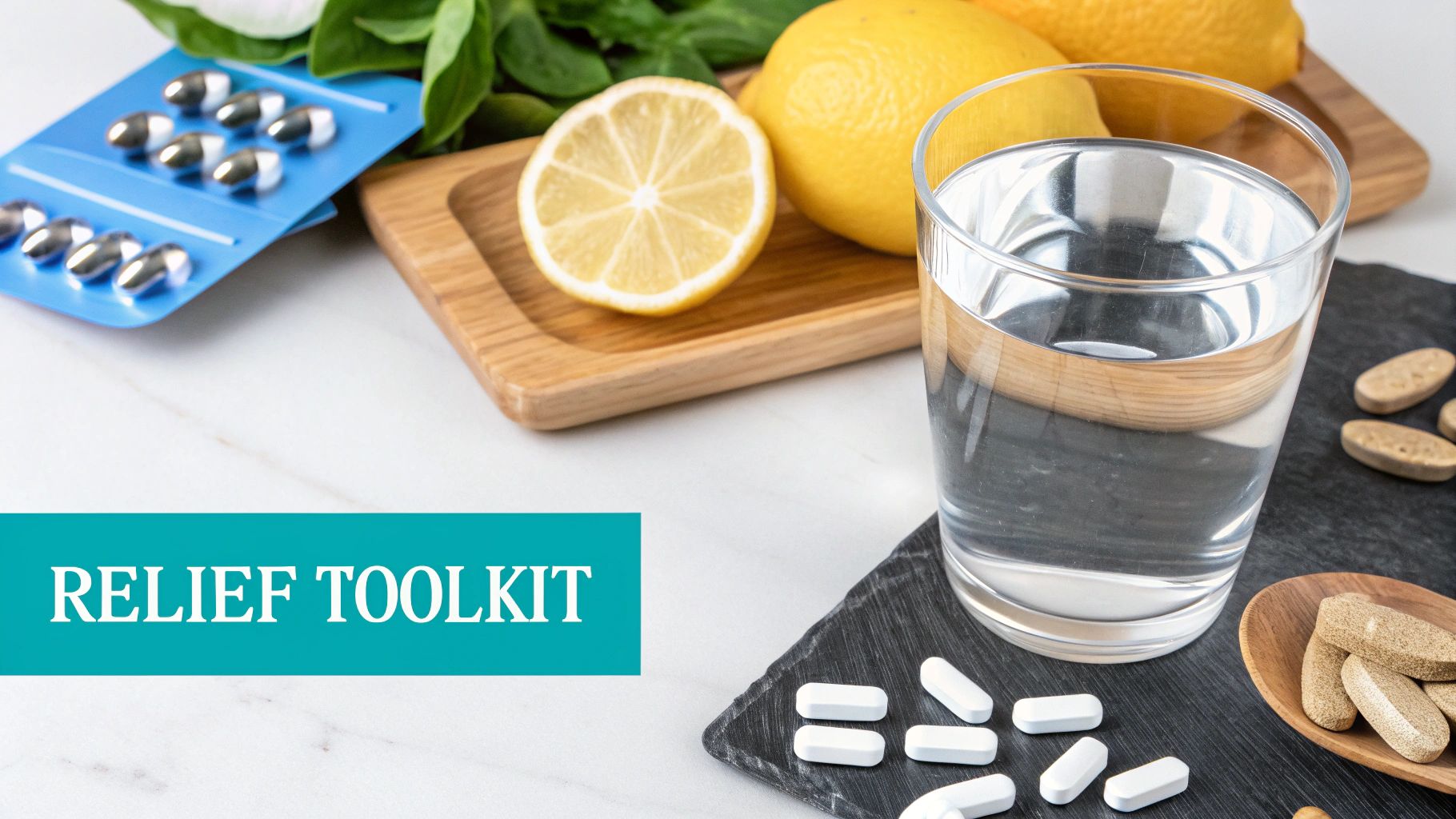

· By Annemarie
Digestive Enzymes For Alcohol Can Improve Hangovers
Let's get one thing straight right away. Do digestive enzymes magically undo a night of drinking? Not exactly. Think of them less as a magic wand and more as an expert support crew for your digestive system. They help everything run smoothly in the background while your liver focuses on the main event: processing alcohol.
By helping your body break down food more efficiently, these enzymes seriously reduce the overall workload, which can mean a much, much better morning after.
How Digestive Enzymes Help With Alcohol
When you have a few drinks, especially with a meal, you’re basically giving your digestive system a double whammy. It has to break down all that food, but at the same time, your body’s primary focus switches to getting rid of the alcohol, which it sees as a toxin.
This sudden shift in priorities can really slow down digestion. The result? That all-too-familiar feeling of being bloated and uncomfortable.
This is where taking a digestive enzyme supplement can be a game-changer. They show up as reinforcements for your gut right when it needs them most.
The Support Crew for Your Gut
Picture your digestive system as a busy restaurant kitchen. Alcohol is like an unexpected, rowdy guest who barrels in and throws the whole operation into chaos. The kitchen staff—your body's natural enzymes—get completely overwhelmed.
Digestive enzymes are the expert chefs you call in to calm the kitchen, organize the cleanup, and keep the food prep on track. They don't deal with the rowdy guest directly, but by keeping the kitchen running, they free up your body's security team—the liver—to focus on its main job.
By providing this backup, digestive enzymes help in a few key ways:
- Efficient Food Breakdown: Enzymes like protease, amylase, and lipase are specialists. They get to work breaking down proteins, carbs, and fats so that late-night pizza or bar snacks don't just sit in your stomach causing problems.
- Reduced Bloating and Gas: When digestion speeds up, food doesn't have a chance to sit around and ferment in your gut. This is huge because that fermentation process is a major cause of uncomfortable gas and bloating.
- Freeing Up Bodily Resources: A struggling digestive system is a major energy drain. By lightening this load, you let your body put more of its resources toward the critical task of metabolizing alcohol and its nasty byproducts.
We've put together a quick table to show you exactly how these key enzymes step up to help your body handle a night out.
Key Roles Of Digestive Enzymes After Drinking
| Enzyme Type | Primary Function | How It Helps After Alcohol Consumption |
|---|---|---|
| Protease | Breaks down proteins | Helps digest protein-heavy foods like burgers or wings, preventing them from sitting in your stomach. |
| Amylase | Breaks down carbohydrates | Tackles the carbs from mixers, beer, and snacks, reducing the chances of fermentation and gas. |
| Lipase | Breaks down fats | Crucial for processing greasy or fried foods often consumed while drinking, easing digestive strain. |
| Cellulase | Breaks down fiber | Helps digest plant-based foods (like bar snacks or garnishes), preventing fiber-related bloating. |
Each enzyme has a specific job, and together, they make sure your digestive system doesn't get overwhelmed when you're enjoying yourself.
Ultimately, using digestive enzymes for alcohol isn't about trying to cancel out a drink. It's a smarter way to support your body's overall function, cut down on digestive stress, and ease one of the major factors that contributes to a miserable hangover. This kind of indirect support can make a world of difference in how you feel the next day.
Why Alcohol Makes You Feel So Bad
To figure out how to feel better after a night out, we first need to look at what’s actually going on inside your body when you drink. That delicious cocktail you're enjoying? Your body sees it as a high-priority threat that needs to be dealt with, fast.
The main responsibility for this clean-up job falls on your liver. Think of it as a super-efficient processing plant. As soon as alcohol hits your bloodstream, it's whisked away to this plant for a two-step breakdown, a process run by a couple of specialized liver enzymes.
The Two-Step Breakdown Process
The journey from that first sip to the morning-after regret is basically a chemical story with two main characters:
-
Step One: ADH Gets to Work: First up, an enzyme called alcohol dehydrogenase (ADH) jumps into action. It takes the ethanol (the fun part of your drink) and converts it into a new, seriously toxic compound called acetaldehyde.
-
Step Two: ALDH Takes Over: Right after that, another enzyme, aldehyde dehydrogenase (ALDH), is supposed to swoop in and break down that nasty acetaldehyde into a harmless substance called acetate. From there, your body can easily flush it out, no problem.
This whole process shows how everything you consume—alcohol, food, and any supplements—has to be managed by your digestive system.

As you can see, when you eat while you drink, digestive enzymes can help your body process the food. This frees up your body's natural resources to focus on metabolizing the alcohol much more efficiently.
The Real Villain: Acetaldehyde
Here's where things go wrong and your hangover is born. This two-step process gets out of whack. Your liver can only produce a certain amount of the ALDH enzyme at a time. If you drink faster than your ALDH can keep up, acetaldehyde starts to build up in your system.
Acetaldehyde is estimated to be between 10 and 30 times more toxic than alcohol itself. It's this buildup that causes all those classic hangover symptoms like headaches, nausea, and that tell-tale facial flushing.
This is exactly why giving your body's natural systems a little support is so important. People are catching on, and there's a huge trend towards proactive health solutions. The global market for digestive enzyme supplements was valued at around USD 2.19 billion in 2025 and is expected to rocket to USD 4.67 billion by 2035. This boom is all thanks to a growing focus on gut health and preventive care. You can check out more details about this growing market on Future Market Insights.
At the end of the day, the misery of a hangover isn’t just about the alcohol you drank. It's about your body struggling to clear out the toxic mess it leaves behind. Once you realize acetaldehyde is the true culprit, it’s easy to see why helping your body break it down is the real key to waking up feeling refreshed.
Connecting Digestion to Your Hangover Severity
Ever noticed that a night of drinking often comes with a lovely side of bloating and an upset stomach? That’s not just in your head. Alcohol is a notorious gut disruptor, creating a stressful environment that makes it way harder for your body to do its job of digesting food and absorbing crucial nutrients.
This digestive stress doesn't just feel lousy on its own—it actually makes your hangover a whole lot worse. When your digestive system is struggling to keep up, it diverts essential resources away from the main event: processing all the alcohol you just drank.
Think of it like a city’s emergency services trying to handle two crises at once.
Your Body's Resource Allocation Problem
Imagine your liver is the city's police force, and it's been called in to manage the massive crisis of processing alcohol. At the very same time, your digestive system—the fire department—is getting slammed with calls about dozens of small fires all over town (like trying to break down that late-night pizza you ate).
If the fire department is completely overwhelmed, it can't spare any crew to help the police manage the main crisis. This is exactly what’s happening inside your body. An overburdened gut demands energy and metabolic attention that should be going to support your liver. The end result? A much slower, less efficient breakdown of alcohol and its nasty byproducts.
By supporting your gut, you’re essentially freeing up your body's resources. This lets your system focus on efficiently tackling acetaldehyde, the primary toxin that’s responsible for your worst hangover symptoms.
Basically, by giving your digestive system a helping hand, you’re allowing your body to focus on the real villain of the story. You can get the full scoop on how this all works by exploring the complete process of alcohol metabolism in our detailed guide.

The Ripple Effect of Digestive Strain
The link between your gut and your head the morning after is way stronger than most people realize. The strain alcohol puts on your digestive tract can kick off a few key issues that make hangovers feel so miserable:
- Delayed Gastric Emptying: Alcohol can actually slow down how quickly your stomach empties itself. This means food just sits there for longer, leading to that heavy, bloated feeling, indigestion, and nausea.
- Increased Inflammation: Alcohol is a known irritant to the lining of your stomach and intestines. This irritation can trigger an inflammatory response throughout your body, contributing to that overall feeling of sickness and discomfort.
- Nutrient Malabsorption: When your gut is under fire, it gets a lot worse at absorbing key nutrients—including the very vitamins and minerals your body is desperate for to recover from a night out.
When you use digestive enzymes for alcohol-related meals, you’re doing more than just fighting the bloat. You’re playing offense. It’s a proactive strategy to reduce the total stress on your system, which allows your body to manage the after-effects of drinking far more effectively. And that paves the way for a much, much better morning.
The Ultimate Hangover Support Toolkit

A truly solid plan for a better morning is about more than just one magic ingredient. While using digestive enzymes for alcohol-heavy meals is a brilliant first move, the best strategies tackle a hangover from all sides. It’s like putting together a team of specialists, where every player has a unique and critical role in getting you back on your feet.
This multi-pronged approach means you aren’t just slapping a band-aid on one symptom. You’re actually supporting your body’s entire recovery process. A great formula combines several powerhouse ingredients that work together for a much better outcome than any single one could deliver on its own.
Digestive Enzymes: The Gut Guardians
First up, you have the digestive enzymes themselves, acting as your gut’s dedicated support crew. When you’re eating while drinking, enzymes like protease, amylase, and lipase get right to work on the food.
- Protease: This enzyme zeroes in on proteins from bar snacks like wings or sliders.
- Amylase: It efficiently tackles the carbohydrates from beer, mixers, and late-night fries.
- Lipase: This specialist handles the fats in greasy food, helping reduce that heavy, bogged-down feeling.
By taking care of the food, these enzymes lighten your digestive system’s workload. This frees up your body to focus its energy on metabolizing alcohol instead. It's a proactive approach that’s catching on fast as more people clue into gut health.
In fact, the global digestive enzyme market, valued at USD 857.3 million in 2025, is expected to nearly double to USD 1.62 billion by 2032. This trend shows a major shift in how we think about the link between our lifestyle choices and digestion. You can check out more on these market trends from Coherent Market Insights.
Powerhouse Ingredients For Full-Body Support
Beyond just digestion, a complete hangover toolkit needs ingredients that target the other core causes of your misery. This is where a well-designed formula like Upside really shines, bringing in backup for your liver and hydration levels.
Think of it this way: digestive enzymes clear the roads (your gut), while other key ingredients help the emergency services (your liver) and restock the city's water supply (your cells).
Let's look at the key players in this all-star lineup.
To really understand how these components work together, it helps to see their distinct roles. Each one tackles a different part of the problem, from digestion to detoxification.
| Component | Primary Role | Benefit for Hangovers |
|---|---|---|
| Digestive Enzymes | Food Breakdown | Reduces gut stress, freeing up the body to process alcohol. |
| Dihydromyricetin (DHM) | Liver Support | Helps the liver break down acetaldehyde, a key toxic byproduct. |
| Electrolytes | Rehydration | Replenishes vital minerals lost from alcohol's diuretic effect. |
| B Vitamins | Energy Metabolism | Restores vitamins depleted by drinking, fighting fatigue. |
Seeing it laid out like this makes it clear why a single-ingredient approach just doesn't cut it. You need the whole team on your side.
Here’s a closer look at what makes them so effective:
- Dihydromyricetin (DHM): This natural plant extract is a total game-changer for liver support. It helps your body process acetaldehyde—the nasty, toxic byproduct of alcohol—more efficiently, getting straight to the root of many hangover symptoms.
- Essential Electrolytes: Alcohol is a diuretic, which is just a fancy way of saying it makes you pee a lot, losing fluids and vital minerals like sodium and potassium. Topping these back up is crucial for fighting off dehydration headaches and fatigue.
- B Vitamins: These vitamins are essential for producing energy and are often wiped out by a night of drinking. Restoring them helps you fight that classic next-day sluggishness. You can dive deeper into this in our article on the science-backed relief of Vitamin B for hangovers.
When you combine digestive enzymes with DHM, electrolytes, and vitamins, you get a powerful, synergistic effect. This complete toolkit doesn’t just ease an upset stomach—it supports your liver, rehydrates your body, and restores your energy, paving the way for a much, much better morning.
A Smarter Way to Use Digestive Enzymes
Knowing that digestive enzymes can help your body out is one thing, but if you want real results, it's all about the timing. To truly lighten the load on your system, these little helpers need to be on the scene and ready to work the moment food and alcohol arrive.
The best game plan is to take your digestive enzyme supplement either right before or with your very first drink. This preps your digestive tract, making sure the enzymes are in place to start breaking down everything from the moment it hits your stomach. It's a proactive move that stops digestive slowdowns before they even start.
This is especially true when you're pairing drinks with a good meal. Having those enzymes ready to go helps your body manage the food efficiently, preventing that digestive stress that so often leads to bloating and discomfort.
Maximize Your Results With Smart Habits
Just taking a supplement isn't the whole story. To really stack the odds in your favor for a better morning, you need to combine it with a few other smart habits. Think of it as building a more effective defense plan.
Here are a few simple but powerful practices to add to your routine when using digestive enzymes for alcohol:
- Pair with Food: Taking enzymes on an empty stomach is like sending a construction crew to an empty lot—they have nothing to work on. These enzymes are designed to break down food, so always take them when you're eating.
- Stay Hydrated (Wisely): Hydration is a must, but chugging a huge glass of water right after eating can actually dilute your stomach acid and the very enzymes you just took. It’s better to sip water steadily throughout the evening instead of flooding your system all at once.
- Listen to Your Body: Remember, these supplements are here to support your body, not give you a free pass to overdo it. Always drink responsibly and pay attention to your own limits.
There’s a reason the market for these supplements is booming. By 2025, the digestive enzyme market is valued at roughly USD 1.19 billion and is expected to climb to USD 1.92 billion by 2029. This incredible growth points to a global shift toward taking digestive health seriously, especially when it comes to lifestyle factors like social drinking. Discover more insights about this growing market on Research and Markets.
Ultimately, this smarter approach is about giving your body the right tools at exactly the right time. If you want to dive deeper into the specific enzymes that give your body a helping hand, check out our guide on alcohol dehydrogenase supplements. By combining strategic timing with mindful habits, you're setting yourself up for a much, much more comfortable day after.
Your Complete Plan For A Better Morning
Using digestive enzymes when you're eating and drinking is a huge first step, but they really start to shine when they're part of a complete strategy. Think of it like this: enzymes are your specialized pit crew, ready to handle the fuel. But you still need a good driver and a well-tuned car to win the race—and feel great the next day.
A truly effective approach supports your entire body, not just your gut. That means focusing on the other non-negotiable pillars of smart drinking. By combining your enzyme supplement with these other critical habits, you're building a solid toolkit to enjoy your night without paying the price later.
Reinforcing The Core Pillars
To make sure you wake up feeling your best, integrate digestive enzymes with these essential practices. Each one tackles a different way alcohol messes with your body, creating a comprehensive defense system.
-
Hydrate Relentlessly: Alcohol is a diuretic, which is just a fancy way of saying it makes you pee more, leading to dehydration. This is a primary culprit behind headaches and fatigue. The easy fix? Sip water consistently all night long to counteract it.
-
Replenish Electrolytes: As you lose all that fluid, you also lose vital minerals like potassium and sodium. These electrolytes are absolutely essential for nerve function and staying properly hydrated. Topping them back up is crucial for avoiding that drained, sluggish feeling.
-
Eat a Balanced Meal: Never, ever drink on an empty stomach. A solid meal with protein, healthy fats, and complex carbs slows down how fast your body absorbs the alcohol. It also gives your body the fuel it needs to process everything—and this is exactly when your digestive enzymes can really get to work.
The All-In-One Solution
This is where a thoughtfully formulated product like Upside makes all the difference. It’s designed to be way more than just a single-ingredient supplement; it’s a complete system in one ridiculously convenient package.
By combining digestive enzymes with other key ingredients, Upside offers an all-in-one solution. It's not just about surviving the next day—it's about giving your body the full spectrum of support it needs to thrive.
Formulas like this bring it all together: digestive enzymes to handle food-related stress, DHM to support your liver, and crucial electrolytes to get your hydration back on track. This holistic approach means you’re fighting the main causes of a bad morning from every angle, which leads to a much, much better outcome. It’s simply the smartest way to party.
Got Questions? We've Got Answers.
When you're trying something new like digestive enzymes to handle a night out, a few questions are bound to pop up. We get it. We've pulled together the most common ones we hear to give you clear, straight-up answers so you can feel confident and make the best decision for your body.
Let's clear up the confusion and get you the info you need.
Can I Take Digestive Enzymes After I Start Drinking?
Absolutely. The best move is to take them before your first drink to prep your system, but taking them during or even after you've started drinking still makes a big difference.
The enzymes will get to work right away on any food in your stomach, helping to cut down on that awful bloating and digestive stress that can happen while your body is busy dealing with alcohol. It’s never too late to give your digestive system a helping hand.
Are There Side Effects of Taking Enzymes With Alcohol?
For most people, nope. Digestive enzymes are generally considered very safe and are well-tolerated. That’s mainly because they’re substances your body already produces naturally. When you take them as directed, side effects are incredibly rare.
That said, if you have a known digestive condition or you're on other medications, it’s always a smart idea to have a quick chat with your doctor first. For the vast majority of us, they're a safe and effective way to support your body.
Will Digestive Enzymes Make Me Less Drunk?
No, and this is a really important one to understand. Digestive enzymes do not affect your blood alcohol content (BAC) or how intoxicated you feel. Their job is to help your body break down food, not the alcohol itself.
By taking the digestive load off your system, they indirectly help your body manage the after-effects much more efficiently. Remember to always drink responsibly and never use any supplement as an excuse to go overboard.
Think of them as a tool for comfort and a smoother recovery, not a green light to drink more. Their primary role is to support your digestive process, not to change how drunk you get.
How Do Products Like Upside Work?
Smart recovery products like Upside don’t just rely on one ingredient; they come at the problem from multiple angles to give you a more complete result.
These formulas are designed to tackle hangover symptoms on several fronts by combining:
- Digestive Enzymes to handle food-related discomfort and bloating.
- Dihydromyricetin (DHM), a powerhouse ingredient that supports your liver's natural detox process.
- A blend of electrolytes to fight back against dehydration by restoring essential minerals.
By hitting multiple root causes at once, these formulas offer comprehensive support that a single-ingredient supplement just can't match. It’s all about setting you up for a much, much better morning.
Ready to wake up feeling fresh after a great night? Upside Hangover Sticks bring together the power of digestive enzymes, DHM, and essential electrolytes in one easy, great-tasting jelly. Support your body, skip the misery, and live more.
Try Upside today and enjoy your nights without the next-day regrets!
#upside #enjoyupside #upsidejelly #livemore #hangovercure #hangoverprevention #fighthangovers #preventhangovers #HangoverRelief #MorningAfter #PartySmarter #HydrationStation #WellnessVibes #RecoverFaster #NoMoreHangovers #HealthyParty #HangoverHacks #FeelGoodMorning #NightlifeEssentials #HangoverFree #SupplementGoals #PostPartyPrep #GoodVibesOnly #HealthAndParty #HangoverHelper #UpsideToPartying
